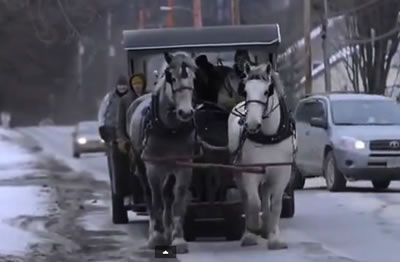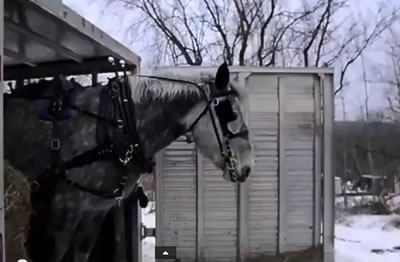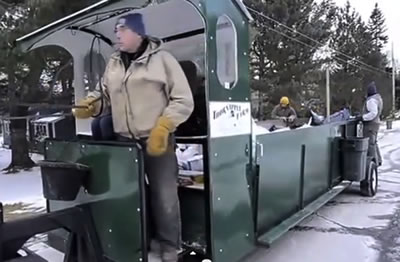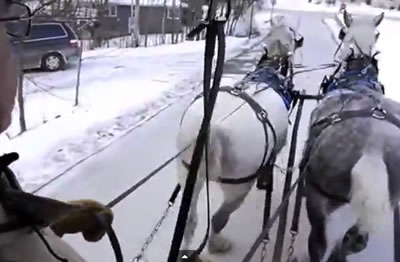
Horseytalk.net Special Interview
Patrick Palmer
Horse and cart still picking up the rubbish in the snow
 The hooves clip-clop, the harness jingles, and the wooden cart rumbles over the street. The sounds evoke a Robert Frost poem more than garbage pick-up, but rubbish and not rhyme is the essence of this operation.
The hooves clip-clop, the harness jingles, and the wooden cart rumbles over the street. The sounds evoke a Robert Frost poem more than garbage pick-up, but rubbish and not rhyme is the essence of this operation.
It's a frigid Friday morning, and just as he has for the past 17 years, Patrick Palmer steers a team of heavily muscled Percheron horses through this old village to pick up trash ($5 a bag) and recycling (free).
The horses pull past Victorians, white clapboard Colonials and trim cottages on streets that were laid out more than a century ago against a steeply rising shelf of the Green Mountains.
Then the trotting team nears a modular home built circa 2011. And a garbage truck roars loudly through the cold winter air. Both are reminders that time has not stopped, after all. This is now, not then. But it is now in Vermont, where quirky, throw-back ideas often find an audience. So this unusual garbage operation goes on in Bristol, a town 30 miles south of Burlington with a population of 3,900.
Happy and horse-poor
Palmer started the horse-drawn rubbish business to supplement the other work his four draft horses do at the 55-acre farm he and his wife, Cathy, own in nearby New Haven. Their passion is training horses, and in order to pay for that, they look for ways to generate revenue. In winter, their horses pull sleighs. In summer, they are hitched up to hay wagons and wedding carriages. During Vermont's autumn moose season, hunters who bag moose hire Palmer and his horses to haul the dead animals out of the woods.
Palmer describes himself as "horse poor" and happy to be that way.
When the village of Bristol put out the call for a garbage contractor 17 years ago, it occurred to Palmer that his horses could do the job. He won the municipal contract and kept hauling as a private contractor after the village and town of Bristol merged and decided not to go with public garbage pick-up any longer.
From the beginning, the route seemed like a good way to go green and to bring in some green to help keep his Percherons fed and stabled.
"I do it with horses because I have to pay for 'em," he explains.
The operation is unique in Vermont, said Barb Schwendtner, environmental specialist at the Department of Environmental Conservation Waste Management and Prevention Division. "I think that's the only one that I've ever heard of," she said.
 Palmer's business is feasible partly because it runs through a compact village, she suggested.
Palmer's business is feasible partly because it runs through a compact village, she suggested.
"Houses are together," Schwendtner said, "and it's not tons and tons of garbage and miles down a route where people are driving fast by you and what not."
Many environmental groups across the country are pushing the trash industry to switch out smelly diesel trucks that average 5-8 miles per gallon to alternative fuels such as natural gas, which burns cleaner than diesel. A few haulers in Vermont have put some of their fleet on an alternative-fuels diet, but they are the minority, even with natural gas prices coming down as the shale-oil industry booms. Compounding the problem is that many towns allow multiple private haulers to drive up and down the same city streets — stopping, going, idling.
"A lot of the savings environmentally come from making the routes more efficient or not having five different haulers working one street," Schwendtner said.
The nine-mile, horse-powered route in Bristol has 250 customers. It takes four hours. Palmer reckons he saves 11 to 12 gallons of fuel each Friday by using horse power. "The stop-and-go traffic with those big trucks, I don't think they get over a mile a gallon," Palmer says.
Another green aspect: His wooden wagon is 16 years old, which means it has outlived many commercial garbage trucks. Keeping the wagon in use could be viewed as a form of "precycling" that saves replacement resources and landfill space. And though a new garbage truck can cost $200,000, Palmer had the cart built for $3,000.
The horse-drawn trash operation has another plus, Palmer adds: He and his helpers are close to the ground, and they pick up litter they see on the streets as they go along. That's hard for drivers on big rigs to do, he says.
However, Palmer expends fossil fuels by trailering the horses between New Haven and Bristol, which are about five miles apart. And the two big loads his team collects are reloaded into a private garbage truck run by the Gauthier company and then hauled to a landfill in Williston some 26 miles away.
That tacks on carbon points.
Rise and shine
 Palmer starts his Friday routine early, by feeding the horses breakfast at Thornapple. "I get up at 4:30, go out, grain 'em, water 'em, and give 'em some hay."
Palmer starts his Friday routine early, by feeding the horses breakfast at Thornapple. "I get up at 4:30, go out, grain 'em, water 'em, and give 'em some hay."
Then he trailers the horses to a Bristol parking lot on Pine Street where he keeps the large green cart they will pull. It weighs about 2,900 pounds empty and 6,000 when piled high with recyclables (clear bags) and trash (dark ones.) The horses weigh 1,800 pounds each and can carry 10 times their weight for short periods and lighter loads for longer periods.
Palmer's two helpers — outfitted, like he is, in layers of sweatshirts, hats, gloves, boots and Carhart work wear — join in to hitch up the horses.
Jake the Percheron waits while Lynda Malzac tosses a bag into the wagon on the team's route Friday, Jan. 31, 2014.(Photo: Glenn Russell, The Burlington, Vt., Free Press)
Isaiah Taylor, 13, of Lincoln helps out every week through a school-to-work program. The tall, lanky teenager proclaims he likes everything about horses: riding them, driving them, tending to them. Also on board: Lynda Malzac, a horse trainer and lifelong resident of Bristol who still keeps horses at her home on the edge of the village.
Friday's trash run is one of the best parts of her week, said the busy grandmother and veterinarian's assistant. "I love it. It's the best. I wish everyone did it in every town," she says. "It makes you stop, slow down a little bit."
Bred to work
 The Percheron breed originated in a region of France known as Le Perche, southwest of Paris. The forebears of today's Percherons were war horses that carried knights into battle. Later, the horses were bred to be heavier and bigger so they could pull stagecoaches, urban omnibuses and replace oxen on the farm.
The Percheron breed originated in a region of France known as Le Perche, southwest of Paris. The forebears of today's Percherons were war horses that carried knights into battle. Later, the horses were bred to be heavier and bigger so they could pull stagecoaches, urban omnibuses and replace oxen on the farm.
Demand for strong, heavy horses in the United States spiked in the 1860s after the Civil War depleted the nation's horse stock. Many draft horses were imported from Europe, including stock from Le Perche, which came to be known as the Percheron. The popularity of the breed grew as the century turned and began to decline in the 1910s and '20s as trucks and tractors took over the work of the draft horse.
By the 1950s, the breed was dying out in the U.S., according to the Percheron Horse Association of America in Fredericktown, Ohio.
Amish farmers helped keep the breed alive, and later horse lovers and tourism-minded business owners spurred a small Percheron revival that continues today. Lighter Percherons can be ridden as saddle horses, but the breed is best known as a work horse or carriage horse.
No special zoning
Palmer is a registered trash hauler with the state of Vermont. He needs no special permit to run his business with horses in Bristol.
"Horses are legal to be on public roads, just the same as bicycles, cars, what have you," said Bill Bryant, Bristol town administrator.
The locals seem to enjoy the presence of the Percherons on village streets.
Said Bryant: "I've had comments from new people in town who just think it's a really, really special and different thing that just kind of makes it a unique thing in the community."







